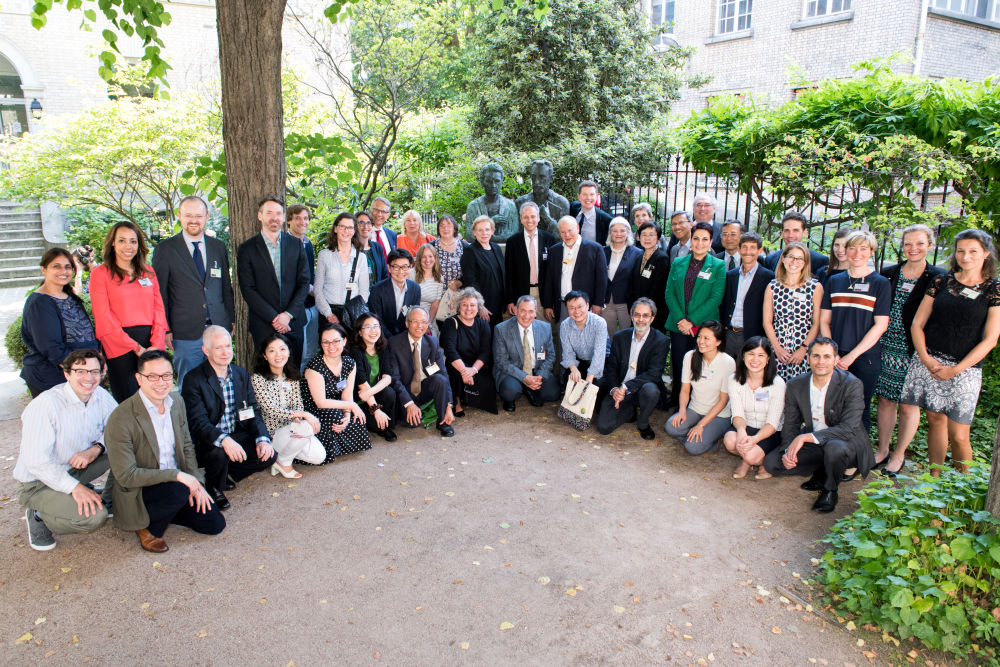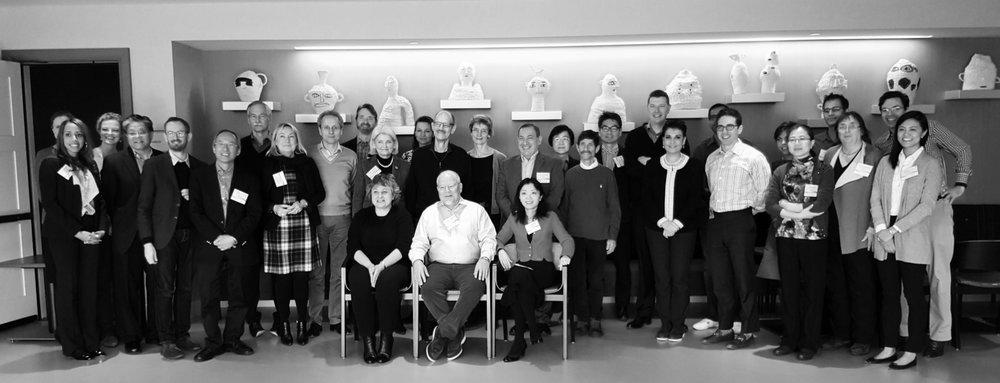The Center of Excellence for Proton Radiotherapy of Malignant Lymphomas
The aim of the Center of Excellence is to deepen the professional and scientific cooperation in the Czech Republic as well as abroad, rationalise indication of proton radiotherapy for lymphoma patients, inform about the possibilities and results of scientific activities and to share results and experience of lymphoma treatment with professionals, doctors of other specialities as well as with patients and the general public.
More than 220 patients with lymphoma diagnosis have been treated in the Prague Proton Therapy Center, located within Na Bulovce hospital. The very first patient was treated in spring 2013. Since then, a unique group of patients treated with proton radiotherapy using the pencil beam scanning technique has been established.
In April 2015, the PTC started to use a treatment combination with the deep inspiration breath hold (DIBH) method for patients with mediastinal disease. This technology is one of the gentlest radiation options for mediastinal tumours. In some cases, the treatment is further combined with attention to other movements unrelated to breathing, such as major blood vessels pulsation or heart movements (rescanning). These options secure safe irradiation of problematic areas, such as the mediastinum and the upper abdominal area (below liver). Such technologically advanced treatment is offered by only a few proton centres worldwide. Thanks to this experience of ours, we are a member of the international ILROG team that has created consensual recommendations for proton radiotherapy for mediastinal lymphomas in adults.
PTC doctors and physicists cooperate on local and foreign recommendations for lymphoma treatment, they lecture on local and international congresses and take part in clinical studies related to lymphoma radiotherapy, such as analysis of dosimetric and radiobiological models comparing modern technologies of photon RT with proton RT.

Uriel Chantraine/Institut Curie
When and Why Indicate Proton Therapy in Lymphoma Treatment
Malignant lymphomas are highly radiosensitive tumours. Radiation treatment is usually recommended as a consequent/supplementary treatment after previous systematic treatment (chemotherapy, biological treatment). It is usually targeted to areas with the highest risk of failure (areas of the original disease, initially high-volume tumours). With regards to excellent efficiency of RT, there is no need to use doses that exceed the limits for surrounding tissue. The topic of malignant lymphoma irradiation in most cases is founded on reduction of the dose to surrounding organs at risk. From the long-term point of view, patients after treatment are threaten mainly by secondary malignancies and cardiovascular diseases. Link.
Fourteen studies have proved that proton RT significantly reduces the burden of radiation to organs at risk. Proton RT shall thus be considered in selected patients, in whom it is possible to significantly reduce the radiation doses to structures at risk.
Proton Therapy Center Czech will focus especially on high-risk groups, for which proton therapy is the most beneficial and the positive results are sufficiently proven. These are:
- Young women with axillar disease, where proton radiotherapy can spare the breast gland and thus reduces the risk of developing a secondary breast carcinoma
- Highly pre-treated patients (after several types of chemotherapy or bone marrow transplant), who are at a higher risk of developing radiation toxicity
- Chemo-resistant patients, i.e. patients with localised disease which has not responded to systematic treatment and where the total radiation dose needs to be increased
- Patients after previous RT within the same or surrounding area
Proton Therapy Indication for Malignant Lymphomas
A major group of patients indicated for RT of lymphoma are patients with a very good long-term prognosis. These patients shall be treated knowing the long-term risks of oncology therapy. These are especially young patients with Hodgkin lymphoma and B-cell non-Hodgkin lymphoma, which has a favourable prognosis (esp. aggressive subtypes of diffuse large B-cell lymphoma, primary mediastinal B-cell lymphoma). For these patients, the approach of “limit doses” shall not be used. The RT technique with the least burden shall always be considered. Proton radiotherapy is the most beneficial for the mediastinal area. Currently, a recommendation by the International Lymphoma Radiation Oncology Group (ILROG) for proton radiotherapy for adults with mediastinal lymphoma has been published: Dabaja BS(1), Hoppe BS(2), Plastaras JP(3). PROTON THERAPY FOR ADULTS WITH MEDIASTINAL LYMPHOMAS: THE INTERNATIONAL LYMPHOMA RADIATION ONCOLOGY GROUP (ILROG) GUIDELINES. Blood. 2018 Aug 14. pii: blood-2018-03-837633. Patients with maximum benefits from proton RT have been identified. These are especially patients in the following situations:
- Mediastinal irradiation, when the irradiated volume (original disease) is in the area below the level of the left coronary artery
- Young women with axillar disease, where proton radiotherapy can spare the breast gland and therefore reduces the risk of developing a secondary breast carcinoma
- Highly pre-treated patients, who are at a higher risk of developing radiation toxicity (esp. lung, cardiovascular toxicity and bone marrow disease)
A smaller group consists of patients with refractory or relapsing lymphomas with localised disease, more frequently with a finding of a larger volume in the mediastinum: Rates of Toxicity and Outcomes After Mediastinal Proton Therapy For Relapsed/Refractory Lymphoma Tseng, Y.D. et al. International Journal of Radiation Oncology • Biology • Physics , Volume 99 , Issue 2 , S62 – S63.
Due to the disease being more aggressive, it is necessary to increase the total radiation dose and the standard photon RT has a high risk of post-radiation complications. In this situation, proton RT can be used as a separate curative method or as “debulking” (reduction of the tumour mass) before planned additional systemic treatment (e.g. allogeneic transplantation). Thus, for some patients, proton RT may be part of a curative treatment approach in situations that were previously thought to be “incurable”.
In a similar indication, we can recommend proton RT for repeated irradiation, where the organs at risk have already been burdened with a dose from the previous RT. Again, long-term disease control can be achieved in limited disease.
References to proton RT indication:
[Hull MC, Morris CG, Pepine CJ, et al. Valvular dysfunction and carotid, subclavian, and coronary artery disease in survivors of hodgkin lymphoma treated with radiation therapy. JAMA. 2003; 290(21):2831-7]. [Cellai E, Magrini SM, Masala G, et al., The risk of second malignant tumors and its consequences for the overall survivalof Hodgkin’s disease patients and for the choice of their treatment at presentation: analysis of a series of 1524 cases consecutively treated at the Florence University Hospital. Int J Radiat Oncol Biol Phys. 2001;49(5):1327-37].
Evidence-based Review užití protonové RT u lymfomů publikace PTCOG (Particle Therapy Cooperative Group), Red Journal 2017.
NCCN guidelines for Hodgkin v.2.2018 and B non-Hodgkin v. 4.2018.
Proton RT is suitable especially for patients with:
- Mediastinal disease, where the irradiated area (the original disease) is located in the area below the left coronary artery, i.e. below Th7 level
- Young women with axillar disease, where proton radiotherapy can spare the breast gland and thus reduces the risk of developing a secondary breast carcinoma
- Highly pre-treated patients (after several types of chemotherapy or bone marrow transplant), who are at a higher risk of developing radiation toxicity (esp. lung, cardiovascular toxicity and bone marrow disease)
- Patients with localised disease which has not responded to systematic treatment (esp. PET positive mediastinal residual) and where the total radiation dose needs to be increased
- Patients after previous RT within the same or surrounding area
Proton RT cannot be indicated in patients:
- With pacemakers – absolute contraindication
- With metal in the irradiated area
Professional Team of the Center of Excellence for RT of Malignant Lymphomas
The Center of Excellence for proton RT of malignant lymphomas will be led by MUDr. Kateřina Dědečková, leading expert for this type of treatment in the Czech Republic.
Other team members include experts in radiation oncology, haematology, haemato-oncology, nuclear medicine, radiodiagnostics, and palliative medicine.
Radiation oncologists
MUDr. Kateřina Dědečková, Proton Therapy Center & Oncology clinic 2nd Faculty of Medicine, Charles University & Motol University Hospital
prim. MUDr. Jiří Kubeš, Proton Therapy Center & Oncology clinic 2nd Faculty of Medicine, Charles University & Motol University Hospital
MUDr. Simona Zapletalová, Proton Therapy Center
Haematooncology
MUDr. Heidi Móciková, Intern haematology clinic 3rd Faculty of Medicine, Charles University & University Hospital Vinohrady
MUDr. Ľubica Gahérová, Intern haematology clinic 3rd Faculty of Medicine, Charles University & University Hospital Vinohrady
MUDr. Kateřina Kopečková, Oncology clinic 2nd Faculty of Medicine, Charles University & Motol University Hospital
MUDr. Jindřich Polívka MHA, TŘI o.p.s., Hospice Good Shepherd Čerčany, Haematology & paliative medicine
Nuclear medicine
prim. MUDr. Lucie Kaliská, Proton Therapy Center
Radiodiagnostics
prim. MUDr. Daniel Klika, Proton Therapy Center
Radiological physicists
Mgr. Vladimír Vondráček, Head of Physicists Proton Therapy Center
Ing. Michal Andrlík, Proton Therapy Center
CLINICAL STUDIES: Participation in Professional Studies in the Czech Republic and Abroad
Intern haematology clinic FN Královské Vinohrady
Oncology clinic 2nd LF UK & FN Motol (modern photon RT-technique IMRT, VMAT) – participation in IESLG 37 study (the role of consolidation RT in patients with primary mediastinal B-lymphoma)
Nuffield Department of Population Health Oxford University (dr.Ntentas)
International Lymphoma Radiation Oncology Group (ILROG)
Cooperation with the Univesity of Florida, the Univesity of Washington (joint database of patients with relapsed/refractory lymphomas, who have undergone proton RT)
PUBLICATIONS Related to the Topic: Click Here
COUNSELLING CENTRE FOR PROFESSIONALS
The Competence Center/the Center of Excellence provide counselling for relevant specialists. Consultations are provided mostly in situations when RT indication is considered or to choose an optimal radiation method. The response time is 5 business days.
If you are a doctor and you are interested in counselling services, please contact us at poradna.lymfom@ptc.cz. Consultation is also possible in English.
OPEN LYMPHOMA INDICATION SEMINAR
If you are a doctor and you are interested in consulting a possible indication of a patient with lymphoma, the Competence Center/the Center of Excellence offers the opportunity to participate in a multidisciplinary lymphoma indication seminar, which takes place at the PTC once a week. For such participation, prior personal agreement is required electronically or by the telephone number provided. In general, relevant scan image documentation (ePACS available) and epicrisis is required in order to provide a consult of the patient.
Information sources Czech Republic and Slovakia
http://www.hodgkin.cz
www.lymphoma.cz
www.lymfomhelp.cz
Information sources in English
www.nccn.org
https://www.ptcog.ch/index.php/other-ptcog-sub-committees?id=53
www.ilrog.com
https://bloodwise.org.uk/
www.ihaddcancer.com
https://lymphoma-action.org.uk/

